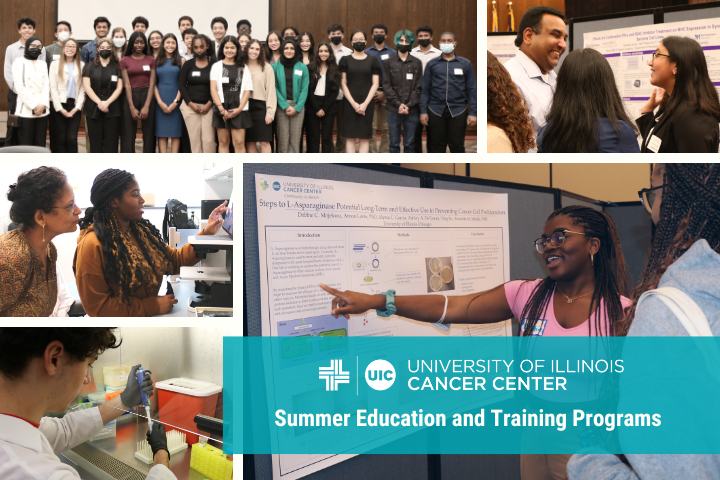
Summer school was not a punishment for these students. In fact, they hoped the summer would last longer.
The University of Illinois Cancer Center introduces high school and undergraduate students to cancer research through a number of different summer programs. Seventeen high school students from the Chicago area participated in two programs this year where their classrooms were laboratories and the coursework was led by University of Illinois Cancer Center members. The young students learned invaluable lessons from renowned researchers that they can use in their future scientific endeavors.
Ten students from city and suburban high schools participated in the Cancer Health Equity Summer Scholars (CHESS) program, an eight-week curriculum that trains and mentors underrepresented minority high school students interested in careers focusing on cancer research and other health professions. The program – attended by students hailing from high schools such as Proviso Mathematics and Science Academy, Rich Central High School, Whitney M. Young Magnet High School, Illinois Mathematics and Science Academy, and Northside College Prep – is a collaboration between the Cancer Center and UIC’s Urban Health Program.
Seven high school students enrolled at Walter Payton College Prep, Neuqua Valley High School, DeVry Advantage Academy, Jones College Prep, Northside College Preparatory High School, Unity Christian Academy, and Whitney M. Young Magnet High School were introduced to cancer research, biophysics, biochemistry, immunology and pharmacology through the researcHStart (RS) program. The multi-institutional program is a collaboration between the Cancer Center, University of Chicago, University of Illinois Urbana-Champaign, Northwestern University and Rush University.
The budding scientists completed their research project under the watchful eye of their faculty mentor. Upon completion of the assignments, the students authored a scientific paper and displayed their work in poster form at a symposium hosted by the Cancer Center. The research ranged from “The Effect of Sphingosine Phosphate Kinase 1 on Cancer Cell Proliferation” to “Cancer Disparities in Disabled Populations.”
Cancer Center members who mentored the students included Dolly Mehta, PhD, Cancer Biology program; Yang Dai, PhD, Cancer Biology; Ekrem Emrah Er, PhD, Cancer Biology; Kyle Schachtschneider, PhD, Translational Oncology program; Susan Magasi, PhD, Cancer Prevention and Control program; Andre Kajdacsy-Balla, MD, PhD, Translational Oncology; Arnon Lavie, PhD, Translational Oncology; Ying Hu, PhD, Cancer Biology; Donald Vander Griend, PhD, Translational Oncology; Larisa Nonn, PhD, Translational Oncology; Kamran Avanaki, PhD, Cancer Prevention and Control; Jiyeon Kim, PhD, Cancer Biology; and Ece Mutlu, MD, MS, Translational Oncology.
The scientific summer programs were not restricted to high school students. Thirty college students also participated in research programs through the Chicago Cancer Health Equity Collaborative (ChicagoCHEC) Research Fellows program, a comprehensive summer learning experience for undergraduate and post-baccalaureate students that focuses on developing skills for careers in healthcare and social, behavioral, or biomedical research.
ChicagoCHEC is a National Cancer Institute comprehensive partnership led by UIC, the Robert H. Lurie Comprehensive Cancer Center of Northwestern University, and Northeastern Illinois University. Its mission is to advance cancer health equity through meaningful scientific discovery, education, training, and community engagement. In addition to the three area colleges, ChicagoCHEC also serves students from area community colleges who are planning to apply to graduate or medical school.
Students were divided into seven teams and conducted research on:
- Improving breast health literacy and awareness on breast cancer screening among Latina women
- Analyzing the link between alcohol abuse and liver cancer to reduce the risk factors in the Black population of Riverdale
- Examining culturally sensitive contraceptive education and unintended pregnancy rates among young Hispanic and Black assigned female at birth (AFAB) in Chicago
- Developing an intervention to increase cervical cancer awareness among heterosexual male partners
- Increasing access to healthier foods through an app-based intervention to reduce obesity and released health outcomes among Chicago adults
- Analyzing barriers to behavioral health among ethnic and racial minorities
- Developing an educational pilot intervention as a tool for addressing the gender disparity in the diagnosis and treatment of male breast cancer
A commencement ceremony was held at UIC’s College of Nursing following the conclusion of the program.
